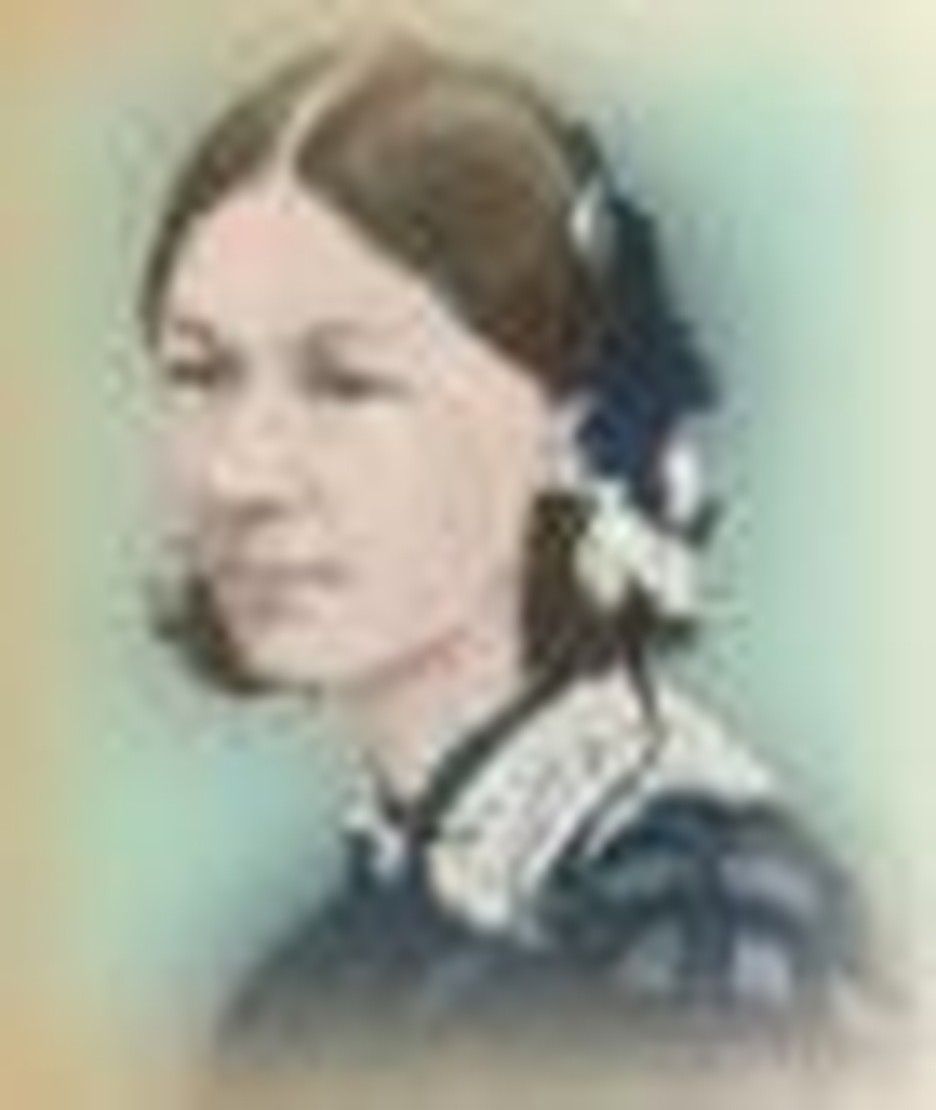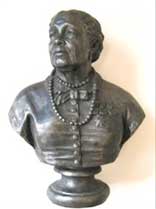
Editor's Note: This issue is in appreciation of the vital role of nurses in our lives. Christian nurses have played an important and often unsung role in this noble profession. This issue looks at two pioneers in the nursing field.
A lady with a lamp shall stand
In the great history of the land,
A noble type of good,
Heroic womanhood.
The lady with the lamp was Florence Nightingale, a woman of privilege whose faith was played out in her caring attention to thousands of ailing soldiers. These lines from the American poet Henry Wadsworth Longfellow (1807-1882), from his 1857 poem "Santa Filomena," helped make her famous. But her mission was merely to help make people well.
From Wealth to War
Florence Nightingale was born of wealthy British parents in the Italian city she was named for. Her father, a banker, made sure that she and her sister received the broadest education possible. Young Florence learned a handful of European languages and could read the New Testament in its original Greek.
As a teenager, she loved the social life her status could afford--the dances, the clothes, the suitors--but there was something missing in all that. "I craved for some regular occupation," she wrote, "for something worth doing, instead of frittering time away on useless trifles." In the next few years, her attention turned to the needs of the sick and dying. Against her parents' wishes, Florence chose a nursing career.
She spent time with the Protestant Deaconesses at their institute in Kaiserwerth, Germany, and was impressed by their simple lives and faithful devotion. Later, she toured hospitals in London, Edinburgh, Dublin, and Paris, studying conditions and nursing methods. In 1853, helped by a small income from her father, Florence became superintendent of the Institution for the Care of Sick Gentlewomen in Distressed Circumstances in London, just in time for an outbreak of cholera.
Florence brought improved care and smart management to her work. Within two years she became her country's leading authority on hospitals. This led to a request from the British government: Would she serve as Superintendent of Female Nurses at a military hospital in Scutari, Turkey, where the army was fighting the Crimean War? This was her life's work. Of course she said yes.
If she thought London's cholera epidemic was tough, this was tougher. Within three weeks of her arrival, Florence had three thousand soldiers to care for. She established a hospital just a few miles from the front. There would be greater danger there, but injured men could get quicker attention.
And that's where the legend of Florence Nightingale arose. A reporter saw her tending to the wounded and wrote, "When . . . silence and darkness have settled upon those miles of prostrate sick, she may be observed alone, with a little lamp in her hand, making the solitary rounds." Not long afterward, Longfellow immortalized her as "The Lady with the Lamp." Upon her return to England, Florence was a national heroine; she became a public health advisor to other nations as well.
A Career Woman, She Never Married
Florence Nightingale never married, though she had several proposals. After refusing one offer of marriage from Richard Moncton Milnes, she confided, "I have a moral, an active nature which requires satisfaction and that I would not find in his life. I could be satisfied to spend a life with him in combining our different powers to some great object. I could not satisfy this nature by spending a life with him in making society and arranging domestic things."
Although she believed generally in women's rights and careers for women, Florence preferred to work behind the scenes. Surprisingly, she did not give support to the concept of women doctors, believing that they were just trying to be men. She considered it more important to have better-trained female nurses. She was also opposed to women making speeches in public.
Yet when it came to health care, Florence was ready to fight. She campaigned successfully to improve the hygiene and health care of the British Army, which she found appalling. At one point, setting forth her core values, she said, "It may seem a strange principle to enunciate as the very first requirement in a hospital that it should do the sick no harm."
She became a champion of nursing education. Wealthy friends, especially John Delane of The Times newspaper, helped Florence to raise £59,000 to found the Nightingale School & Home for Nurses at St. Thomas's Hospital, London. At last nursing became a respectable and sought-after profession.
Religion: Florence's Mysticism
Florence was baptized in the Church of England, and during her last years she was a frequent communicant. Yet throughout her life she had sought a deeper experience of God, something beyond the socially expected rituals she had grown up with. Something she called Mysticism. "For what is Mysticism?" she wrote once. "Is it not the attempt to draw near to God, not by rites or ceremonies but by inward disposition? Is it not merely a hard word for 'The Kingdom of Heaven is within'?"
When she broke from family expectations to become a nurse at age 30, she noted that this was the age when Jesus began his ministry. She clearly saw her work as a way of following her Lord. And what better way to commit one's life to the Healer than by devoting oneself to healing? She once told an assembly of nurses, "Christ is the author of our profession."
At her death in 1910, Florence Nightingale was buried in her family's 13th-century parish church, St. Margaret, in Hampshire, England. In recognition of her life of Christ-like care, there is a movement to have Florence commemorated in Lesser Feasts and Fasts of the Episcopal Church.
The Christian Call to Care
Early church scholars tell us that many Christians in the Roman world were known as healers. Though mocked in public and sometimes arrested and persecuted, Christians were often sought out in times of illness, and they developed a reputation for healing power--especially Christian women. While the power of prayer and divine healing might account for some of this, it's also likely that Christians were among the few who cared and dared enough to provide basic nursing attention.
A Museum Just for Florence
The Museum is located at 2 Lambeth Palace Road in London, England. It contains artifacts owned or used by Florence Nightingale, material connected with the Crimean War and objects from the Nightingale School and St. Thomas Hospital (1860-1910). There are also 63 letters from Florence, books written by her, related portraits, and other images. The British Library contains 8,000 letters or copies in Florence Nightingale's handwriting.
What Were They Fighting for in the Crimea? (1853-1856)
Ostensibly it was another Crusade, but it was really just a power grab. The Ottoman Turks, who controlled Palestine, had been giving Roman Catholics more access to the sacred sites than the Russian Orthodox. So Russia attacked the Turkish navy, and then France and Britain joined the fray to oppose Russian expansion. There was great popular support in England for this military action. Queen Victoria wrote to the King of Belgium, "The War is popular beyond belief." But the conflict was very costly for both sides. In defeat, Russia lost 600,000 men.
While working in the military hospital during the Crimean conflict, Nightingale wrote in a letter:
"In the midst of this appalling horror there is good--and I can truly say, like St. Peter, 'It is good for us to be here'--though I doubt whether, if St. Peter had been here, he would have said so."
Mary Seacole: Another Angel of the Crimean War They called her "Mother Seacole," the black woman who nursed soldiers on the battlefield--even during combat. She was also seen on occasion helping fallen enemy soldiers.
Mary Seacole was born in Kingston, Jamaica, in 1805, of a Jamaican mother and a Scottish military officer. Though not a trained nurse, she learned her skills caring for invalid soldiers in her mother's boarding house. Mary came to England in 1864 and applied to the war department to be sent to the Crimean War as a nurse. Her appeal was rejected.


That didn't stop this determined woman. Seacole raised money on her own to finance her journey to the Crimea. There she set up the British Hotel--half hostel, half hospital--using her own funds to provide "mess-table and comfortable quarters for sick and convalescent officers." This in itself was a valuable service, but Mary wasn't satisfied. Her nursing skills were needed on the battlefield.
Over the next year, she visited the soldiers' campsites, dispensing medicine, meals and other necessities. At times she went right to the battlefield to care for the wounded. Soldiers became familiar with this angel of mercy in her colorful outfits, rushing to tend their fallen comrades.
When the Crimean War ended, Mary returned to England. Financially bankrupt, she wrote an autobiography, The Wonderful Adventures of Mrs. Seacole in Many Lands, which became a bestseller. After several years, Seacole's work was largely forgotten, but in the last few decades, it has seen renewed interest. Her autobiography was reprinted in 1984 by Falling Wall Press. And several groups are trying to bring this role model back to the attention of the world. Perhaps closest to Mrs. Seacole's heart would be the Mary Seacole Centre for Nursing Practice on the London campus of the Faculty of Health and Human Sciences, Thames University. She would certainly love the thought that others are being taught to care for the wounded as she did.
"I am not ashamed to confess," Mary Seacole wrote in her autobiography, "that I love to be of service to those who need a woman's help. And wherever the need arises -- on whatever distant shore -- I asked no greater or higher privilege than to minister to it."
"I have stood by receiving the last blessings of Christians, and closing the eyes of those who had nothing to trust to but the mercy of a God who will be far more merciful to us than we are to one another; and I say decidedly that the Christian's death is the glorious one, as is his life." -- Mary Seacole
There is a movement to place a statue of Mary Seacole on the empty plinth in Trafalgar Square. This is especially appropriate since Mary's husband, Edward Horatio Hamilton Seacole, was the godson of the British naval hero, Admiral Lord Nelson, whose statue dominates the Square.







